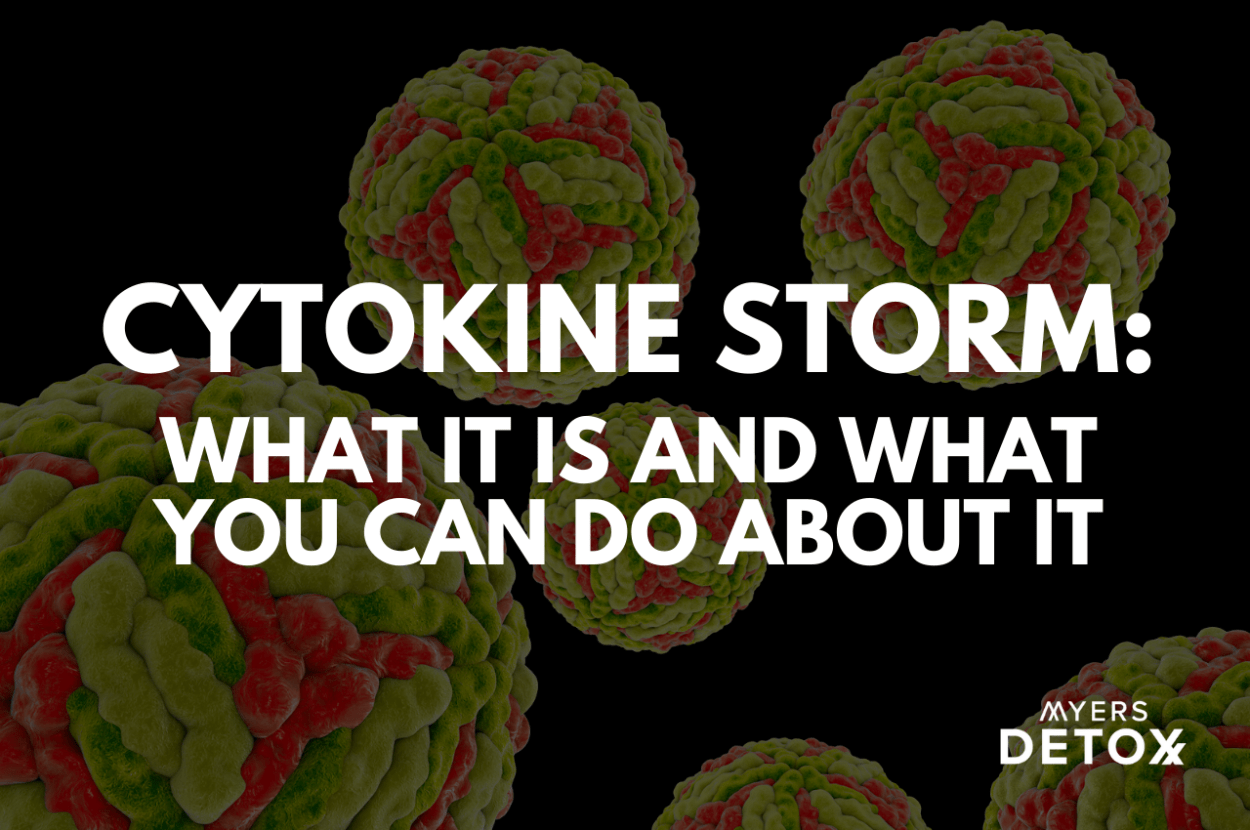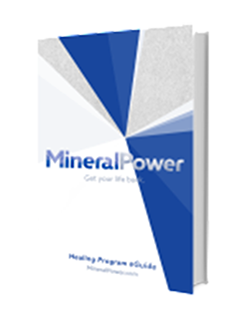The term “cytokine storm” seems to be popping up a lot lately. But what exactly is a cytokine storm, and is this something you should be concerned about?
In this article, you’ll learn:
- What cytokines are
- What a cytokine storm is
- The dangers of high levels of cytokines
- Natural plant medicines that can support immunity against a cytokine storm
What Are Cytokines?
Cytokines are cell signaling molecules, also called chemical messengers, that support the communication between the cells of your immune system. The word cytokine comes from the Greek words “cyto,” meaning cell, and “kinos,” meaning movement.
As such, cytokines signal the cells in your immune system to move towards the direction of imbalance, whether from physical injury, inflammation, or infection.
There are several different types of cytokines that can be released by your immune cells, some pro-inflammatory and others anti-inflammatory.
They can come in the form of proteins, glycoproteins, or peptides, and they can exert both local and systemic effects in your body. Cytokine messengers can even exert an effect on the very cell that they were excreted from.
As signaling molecules, cytokines play a crucial role in both innate immunity as well as your adaptive immune response[1].
What Is A Cytokine Storm?
Specifically, when someone experiences a “cytokine storm,” their immune system goes into overdrive, and they release uncontrolled levels of inflammatory cytokines. This results in the activation of even more immune cells and an uncontrolled inflammatory response.
It’s essential to understand that an inflammatory response by your immune system is actually a protective mechanism. Inflammation happens as immune cells quickly react to injury or imbalance, removing toxic compounds, and initiating the healing process[2].
In a cytokine storm, however, your inflammatory response goes from beneficial to destructive with an onslaught of uncontrolled inflammation.
In the case of infectious disease, when a pathogen enters your body, it can have any number of outcomes. On the one hand, some pathogens will enter your body and appear invisible to your immune system. This allows them to take hold and cause infection unencumbered by your immune cells.
On the other hand, some pathogens can hyperstimulate your immune system (cytokine storm), which prevents the clearance of infection. A cytokine storm begins at a local site (typically an organ or tissue) and then spreads throughout your body via systemic circulation.
The inflammation is generally accompanied by pain, redness, fever, and edema and often results in tissue damage.
This tissue damage could range from mild to severe, and if the inflammation is unable to be controlled, it can result in organ dysfunction, or even become life threatening[3].
When the local inflammation spills over into systemic circulation, it can cause sepsis, affecting multiple organs in your body — potentially leading to multiple organ failure.
Why some people experience a cytokine storm in the presence of certain pathogens and others don’t is still unclear. There do, however, appear to be some genetic and age-related components[4].
While not completely understood, the phenomena of a cytokine storm does shed some light on why some people may experience severe illness while others seem to only have mild symptoms[3].
How To Prevent and Calm a Cytokine Storm
The understanding of the cytokine storm phenomena is relatively new, and researchers are still learning a lot about the mechanisms of this pathology and how to prevent and reverse it. With that being said, it does appear that down-regulating your inflammatory immune response to calm inflammation can have a beneficial impact on the outcome of a cytokine storm.
Luckily, mother nature has provided us with a treasure trove of plants and nutrients that are meant to do just that, including[3]:
Turmeric
In the world of natural healing, no plant has gotten as much attention for its anti-inflammatory activity as turmeric. This could be due, in part, to the fact that it’s been used for thousands of years in Eastern cultures as a healing plant to modulate the inflammatory response.
Turmeric contains the active compound curcumin, which has been the focus of much of the research surrounding this healing root. Studies show that curcumin has the ability to suppress both the production and release of inflammatory cytokines[5].
In one paper, looking specifically at the role of curcumin in a cytokine storm, researchers explain that curcumin is able to block pro-inflammatory cytokine release from monocyte and macrophage immune cells. Therefore, curcumin given therapeutically may be able to suppress the cytokine storm[6].
Fulvic Acid
Fulvic acid is found in the humus layer of soil and is the product of the decomposition of plants and organisms. It’s composed of several different acids and is primarily known for its abundance of minerals.
The anti-inflammatory activity of fulvic acid is one of its best-known therapeutic potentials. In chronic diseases like diabetes, fulvic acid successfully reduces inflammatory cytokines like TNF (tumor necrosis factor), interleukin-1, and interleukin-6[7].
These cytokines are responsible for the inflammatory response to infections as well as activating the adaptive immune response[8].
I use a binder with fulvic acid for maximum detox support.
Berberine
Berberine is a plant compound found in herbal remedies like goldenseal, Oregon grape, and barberry. Research on berberine has primarily focused on its anti-diabetic activity, with an ability to regulate blood glucose and reduce insulin resistance. It’s also been shown to normalize blood lipid markers, and have all around metabolic health potential[9].
Many of its positive effects, however, are attributed to its anti-inflammatory activity. Research shows that berberine can inhibit the expression of inflammatory cytokines, while also reducing the oxidative stress that often accompanies inflammation.
What’s more, berberine has been shown to improve mitochondrial function, which is the energy production center of your cell. This is a crucial detail, as your immune system can’t get much done without the energy to fuel it[10].
I like this Berberine for its anti-inflammatory and anti-diabetic effect
Cinnamon
Cinnamon may be one of the most low-key healing spices out there. While this warming spice is a common ingredient in baked goods, oatmeal, and pretty much every fall-inspired treat you could think of, its healing properties often go unrecognized — at least by Western medicine.
In the East, however, cinnamon is another plant that’s been used for thousands of years in healing modalities such as Traditional Chinese Medicine and Ayurveda. It contains an active compound called cinnamaldehyde, which has been studied for its antioxidant and anti-inflammatory activity in a variety of health conditions.
Cinnamaldehyde works with inflammation in your body by inhibiting pro-inflammatory cytokines and modulating your immune system’s inflammatory response. It also regulates the activity of anti-inflammatory cytokines to further drive-down inflammation[11][12].
You can find cinnamon in my Daily Detox formula!
Green Tea
You may not be very surprised to find green tea on this list, as its health benefits seem to permeate pretty much every aspect of healing. Green tea is known for its potent antioxidant potential due to its abundance of polyphenol compounds, but this plant is also a powerful anti-inflammatory.
While many of the previously mentioned healing plants work to suppress cytokine release from your innate immune system, green tea works on your adaptive immune system. Your adaptive immunity comes in a little slower than innate immunity and often has a more targeted approach.
When it comes to a cytokine storm, however, both branches of your immune system play a role.
Green tea polyphenols can alter the release of inflammatory cytokines from your lymphocytes (adaptive immune cells), and at the same time, enhance your antioxidant defenses. Furthermore, there is some evidence that these polyphenols may also instigate the release of anti-inflammatory cytokines[13].
This detox superfood formula contains green tea extract. Green tea extract can also be found in this immune health blend.
Moringa
Moringa is a plant that’s gained popularity in the last five or six years, but like many others on this list, it has been used in traditional healing modalities for thousands of years. Just a handful of its healing properties include anti-inflammatory, antioxidant, anti-diabetic, antimicrobial, and ant-cancer[14].
Due to its broad range of health benefits, moringa is often used to support immunity — especially in inflammatory related diseases.
Research shows that moringa can inhibit the secretion of inflammatory cytokines from immune cells, while also regulating nitric oxide (another compound that can either induce or inhibit inflammation)[15].
Make sure that you use an organic moringa to avoid any toxic exposure.
Melatonin
Melatonin is a hormone that’s involved in your circadian rhythm and plays a crucial role in the regulation of your sleep cycle. While not typically thought of as an immune-enhancing compound, melatonin actually imparts potent anti-inflammatory and antioxidant activity.
Research shows that melatonin is protective against acute lung injury (ALI) and acute respiratory distress (ARD), which are two common complications of cytokine storms. What’s more, melatonin has also been shown to inhibit the release of inflammatory cytokines and down-regulate the recruitment of inflammatory cells.
Who knew a hormone that helps with sleep could be so effective against inflammation?
While your body makes melatonin on its own, as you age, your levels of melatonin slowly decline. Therefore, supplementation with melatonin is absolutely crucial for the health of your immune system.
I’m a huge fan of these Liposomal Melatonin Drops. Not all melatonin supplements are the same, and this company delivers melatonin in a highly bioavailable liposomal form. It works incredibly fast, and it allows you to be flexible with your dose
Essential Oils
Essential oils offer a gentle yet effective way to calm inflammation. These subtle, yet highly effective oils contain hundreds of compounds that work synergistically in your body to restore balance. One of the primary concerns with a cytokine storm is inadvertently stimulating your already overactive immune response.
With essential oils, you don’t have to worry about overstimulation due to the inherently balancing nature of the oils.
For a cytokine storm specifically, there are a handful of oils that research shows may impart significant benefits, these include:
- Frankincense Oil — Increases the activity of white blood cells and suppresses the release of several inflammatory cytokines[17][18]
- Copaiba Oil — Suppresses inflammatory cytokines symptoms[19]
- Thieves Essential Oil — Thieves oil is a blend of clove, lemon, cinnamon bark, eucalyptus, and rosemary essential oils. This combination supports your immune system on all levels.
- Lavender Oil — Aside from it’s known benefits in supporting your nervous system; lavender is also a potent anti-inflammatory and antioxidant essential oil. It works particularly well in acute inflammatory responses by blocking the activity of pro-inflammatory cytokines[20].
When choosing essential oils, quality is crucial. You get exactly what you pay for when it comes to these oils, and if you cut corners on price, you can bet that the oil contains chemicals and additives instead of the healing compounds you’re looking for.
After a lot of research into quality and purity, these are the oils I recommend.
Takeaway: Fight Inflammation Naturally
The term “cytokine storm” may sound pretty formidable, and in many cases, it can be quite devastating, but this does not mean you’re powerless against this onslaught of inflammation.
The best way to avoid an immune attack like this is prevention, so be sure to arm yourself and your loved ones with the anti-inflammatory nutrients that mother nature has provided.
While the initiation of a cytokine storm is still not fully understood, what’s clear is that a weakened or unmanaged immune response seems to play a role. Therefore, infusing your body with nutrients that are well-researched and known to inhibit and suppress the release of cytokines is crucial.
Every day I arm my immune system with two supplements that support my organs and immunity on a cellular level — Daily Detox and CitriCleanse.
Daily Detox is your all-in-one full-body detoxification supplement, including inflammation inhibitors like turmeric, moringa, cinnamon, and green tea. CitriCleanse, on the other hand, includes fulvic acid, which not only supports a healthy inflammatory response but also targets heavy metals to keep your immune and detox pathways functioning optimally.
Daily Detox and CitriCleanse perfectly compliment each other to provide comprehensive support to your immune system in general, and all of the organs that play a role in immunity.









